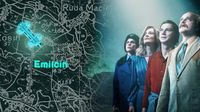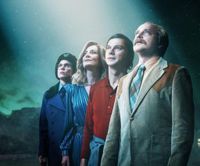Netflix's latest miniseries, "Projekt UFO," directed by Kasper Bajon, dives into the intriguing world of UFOs and the peculiar events surrounding them in 1980s Poland. Set against the backdrop of a small village called Truskasy in Warmia, the series blends elements of comedy and drama while exploring the real-life inspirations behind its narrative.
"Projekt UFO" premiered on April 16, 2025, and has quickly garnered attention for its unique take on a subject that has fascinated many: unidentified flying objects. The series is inspired by actual events, notably the Emilcin incident, where a farmer named Jan Wolski claimed to have encountered extraterrestrial beings on May 10, 1978. This incident has become a cornerstone of Polish ufology and is referenced throughout the miniseries.
At the heart of the story lies Zbigniew Sokolik, portrayed by Mateusz Kościukiewicz, who passionately investigates the claims of farmer Kunik, played by Stanisław Pąk. Kunik insists that he was abducted by strange green creatures, which adds a humorous yet poignant layer to the narrative. Sokolik's character is depicted as a determined ufologist, eager to uncover the truth behind Kunik's bizarre experiences.
Joining Sokolik in this quest is Jan Polgar, a fading television star played by Piotr Adamczyk. Polgar is not only skeptical but also relies heavily on science and reason, often clashing with Sokolik's more enthusiastic approach. The dynamic between these two characters highlights the tension between belief and skepticism, a theme that resonates throughout the series.
The series also features Maja Ostaszewska as Wera, a glamorous TV presenter and wife of a powerful party activist, played by Adam Woronowicz. Wera's character adds depth to the plot, as she navigates the complexities of fame and ambition, often using the UFO phenomenon to her advantage.
As the characters delve deeper into their investigations, they encounter various challenges, including political intrigue and societal skepticism. The narrative cleverly intertwines the personal dramas of its characters with broader themes of power and manipulation, reflecting the tumultuous political climate of the era.
The 1980s setting is not just a backdrop; it plays a crucial role in shaping the characters' motivations and the story's progression. The series captures the essence of a time marked by uncertainty, strikes, and empty store shelves, creating a rich tapestry that enhances the viewer's experience.
In one memorable scene, Sokolik presents a groundbreaking lecture on unidentified underwater objects (NOPs) during a meeting of the Gaja association, which is met with skepticism from the audience. This moment serves as a commentary on the challenges faced by those who dare to challenge the status quo, particularly in a society where conformity is often valued over individual thought.
"Projekt UFO" does not shy away from exploring the darker aspects of its narrative. The character of Julia Borewicz, a near-sighted policewoman played by Julia Kijowska, grapples with her own struggles while seeking to uncover the truth about the alleged alien encounters. Her character adds a layer of emotional depth to the series, showcasing the personal stakes involved in the pursuit of truth.
Furthermore, the series is rich with cultural references and allusions that enhance its storytelling. The phrase "Polish Roswell" is used to describe the Kunik incident, drawing parallels to the well-known UFO events in the United States and highlighting the global fascination with extraterrestrial life.
Critics have praised Bajon's direction and the performances of the cast, particularly Adamczyk's portrayal of Polgar, which has been described as a mesmerizing blend of humor and pathos. His character's evolution throughout the series reflects the broader societal tensions of the time, making him a relatable figure for viewers.
Despite its comedic elements, "Projekt UFO" is ultimately a story about human connection and the lengths people will go to in search of truth. It invites viewers to ponder the nature of belief and skepticism while navigating the complexities of personal ambition and societal expectations.
As the series unfolds, it becomes evident that the truth about UFOs may be less important than the stories we tell ourselves about them. The characters' journeys serve as a metaphor for the human experience, where the quest for understanding often leads to unexpected revelations.
In conclusion, "Projekt UFO" is more than just a comedy-drama about aliens; it is a thoughtful exploration of the human condition set against a backdrop of political and social upheaval. With its engaging characters, clever writing, and rich historical context, the series is a must-watch for anyone intrigued by the mysteries of the universe and the complexities of human nature.







